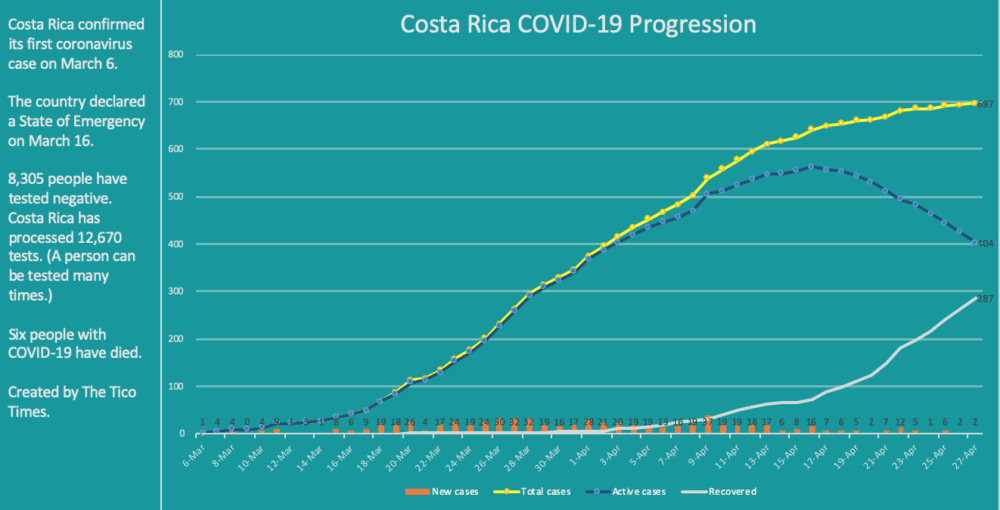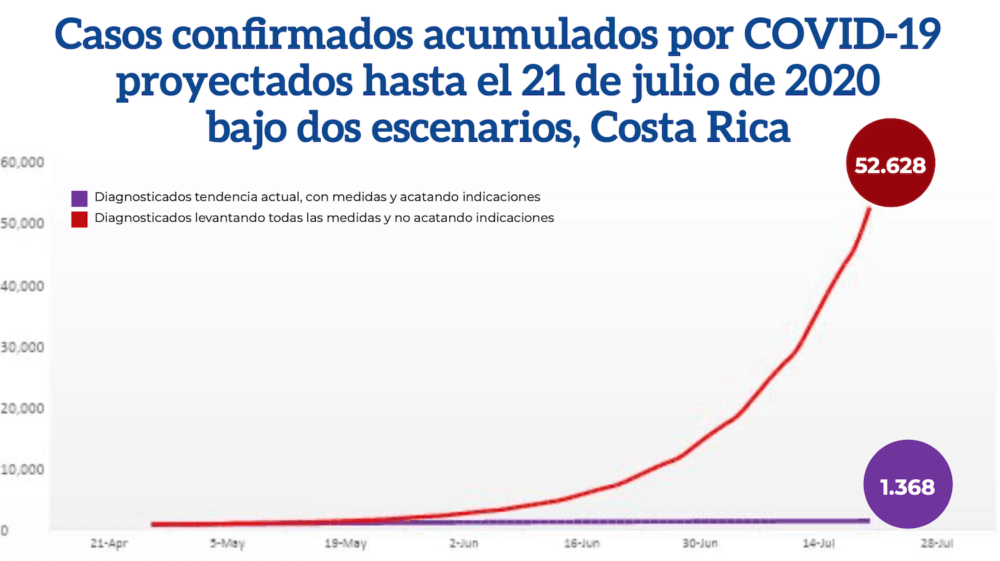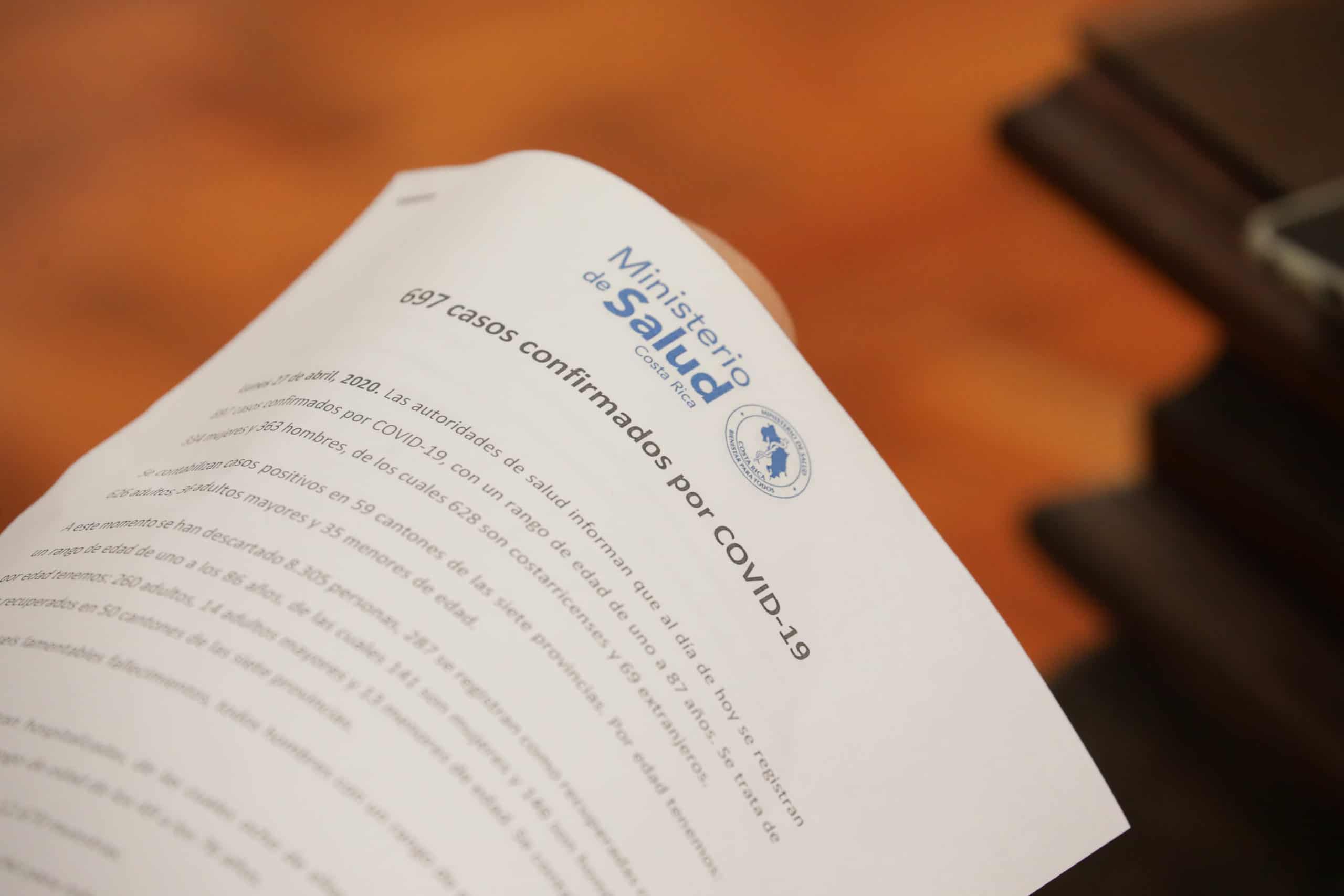Costa Rican authorities on Monday shared a roadmap for long-term monitoring of the coronavirus and the gradual reactivation of the country’s economy.
Beginning May 1, Costa Rica will ease some coronavirus restrictions. The Health Ministry will reevaluate every 15 days to decide what measures it can further relax.
The coronavirus will likely directly affect Costa Rica for months to come. Here’s what the Health Ministry presented Monday as the country’s long-term strategy:
Costa Rica may have crested first wave
Because Costa Rica has recorded nearly two weeks of decreasing active coronavirus cases, the country may be on the back end of the first wave of the pandemic, according to Health Minister Daniel Salas.
“We’ve had success until now,” Salas said, noting Costa Rica’s success is atypical compared to that of many other countries.

A second coronavirus wave in the coming weeks or months could be more severe than the first.
Because the majority of Costa Ricans have not been exposed to SARS-CoV-2, a large percentage of the population is still susceptible to the virus. (And, while it’s likely, there’s “no evidence yet” that people who have had the coronavirus remain immune it, the World Health Organization has said.)
Projections show risks of easing measures quickly
If Costa Rica were to lift all coronavirus measures and citizens stopped following sanitary recommendations, the country could see a dramatic rise in sicknesses.
Charts presented by the government, citing calculations from the Research Center of Pure and Applied Mathematics at the University of Costa Rica (UCR), indicate Costa Rica could surpass 52,500 total coronavirus cases by mid-July in a worst-case scenario.

At that mid-July date, the data indicate Costa Rica could have more than 32,000 active cases and 1,200 patients requiring an intensive care bed. Those figures would far surpass the country’s capacity; Costa Rica’s public health system has just 140 ICU beds.
Conversely, strict isolation policies could limit total cases in mid-July to fewer than 1,500. In the most optimistic scenario, all critical patients would have access to necessary care, the projections indicate.
Neither the Health Ministry nor UCR provided more details regarding the projections. It’s likely mid-July will look significantly better than the worst-case projection, but worse than the best-case path.
Still, what the Health Ministry presented Monday offers some insight into just how differently Costa Rica could experience the upcoming months.
“What happens if we let down our guard?” Salas said. “If we let down our guard, by mid-July, we could have 52,628 total cases of COVID-19.
“That’s a lot of grave cases and a lot of hospitalized patients, and there won’t be enough space for all of them.”
Steps for economic reactivation
The Health Ministry detailed the following necessities for its public health system during the coronavirus crisis:
- The country must expand its national vigilance protocols to quickly detect future outbreaks.
- The country must intensify hygiene measures and physical barriers.
- The country must reinforce its hospital and general healthcare capacity.
- The country must stay prepared to re-apply measures in critical situations.
As the Health Ministry considers which measures to roll back, it will stratify the risk of activities as follows:
- The potential for virus spread.
- The individual risk for those involved.
- The potential to modify the activity.
- The geographic risk.
- The social impact and other collateral damages caused by restricting the activity.
Activities will be permitted only if organizers enact — and participants adhere to — strict protocols to minimize the potential for virus spread, according to the Health Ministry.
The Health Ministry will evaluate measures every 15 days and gradually lift restrictions as long as the epidemiological curve remains stable.
Coronavirus monitoring and risk assessment
Costa Rica’s long-term plans for monitoring the coronavirus are as follows:
- Identifying cases through testing and containing transmission via contact tracing.
- Expanding sentinel sites that monitor for respiratory viruses at various locations nationwide.
- Maintaining vigilance in high-risk communities.
- Conducting seroprevalence studies in at-risk groups.
We’ll know more about these plans over the coming weeks.
Right now, Costa Rica conducts 200 sentinel tests each week to identify what respiratory viruses — including SARS-CoV-2 — are present in the country. (This is in addition to testing all suspected coronavirus cases.)
Summary: How Costa Rica will handle the coronavirus
Costa Rica has so far succeeded in limiting the spread of the coronavirus. In order to keep it that way, health authorities say the country must tread very carefully.
On Friday, May 1, some businesses can reopen for the first time in more than a month. In two weeks, if the situation remains stable, a few more activities will be allowed. Two weeks after that, a handful of others.
As President Carlos Alvarado emphasized, this will be a measured process requiring discipline (and patience) from Costa Rican citizens and residents.
Like a novice acrobat on a tightrope, this is Costa Rica’s path forward: one small step at a time, and making calculated movements so as to not fall over entirely.






